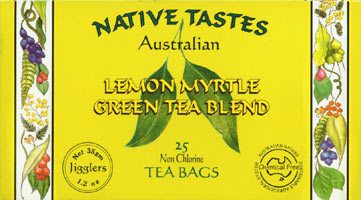
LEMON MYRTLE
Delicious source of citral

| Lemon scented myrtle, also called lemon ironwood, is a tropical rainforest shrub native to Australia that can grow into a full tree. It is a relative of the fragrant eucalyptus, another native Australian tree. The botanical name of lemon myrtle, Backhousia citriodora, was a tribute to James Backhouse, an English botanist. The name was given by Baron Ferdinand von Mueller, a German botanist who was curator of the Melbourne Botanical Gardens in 1853; the species name includes reference to the citrus taste of the leaves. The main flavor constituent of lemon scented myrtle is citral, which is responsible for most of the lemon scents and flavors in nature, including that found in the lemon fruit, in lemon grass, lemon balm, and lemon verbena. Citral's lemony taste is covered up by additional flavorings but is still present in significant amounts in other common culinary and medicinal herb materials, including ginger rhizomes and sweet basil. Citral has several medicinal uses. It is a potent antiseptic and may prove useful in treating gastro-intestinal infections, including Helicobacter pylori, which is responsible for many cases of gastric ulcer. It has antispasmodic properties that help alleviate intestinal spasms, as may occur with intestinal infections or adverse reactions to foods. Overall, it has a relaxing effect. Further, one of its modern applications is for treating throat disorders, either due to infection or to overuse and irritation. |
Eventually, as demand for this plant has grown, it was cultivated as a source of the leaves. The leaves are used for making tea or extracted to yield the fragrant essential oil, which is over 90% citral. The oil can additionally be used as a fragrance, an insect repellent, a substitute for lemon flavor, and as a topical antiseptic.
 Citral |  Teabag packaging, lemon myrtle |  Organic cultivation of lemon myrtle in Australia | Australian lemon myrtle tea in teabags is available plain, with green tea, or with black tea. |